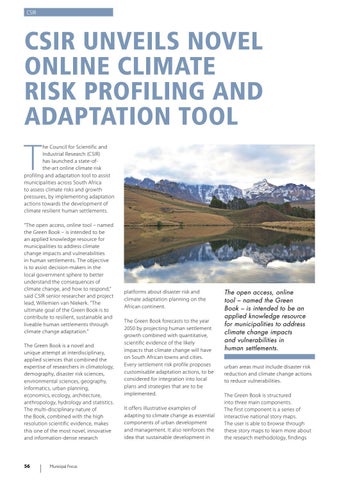CSIR
CSIR UNVEILS NOVEL ONLINE CLIMATE RISK PROFILING AND ADAPTATION TOOL
T
he Council for Scientific and Industrial Research (CSIR) has launched a state-ofthe-art online climate risk profiling and adaptation tool to assist municipalities across South Africa to assess climate risks and growth pressures, by implementing adaptation actions towards the development of climate resilient human settlements. “The open access, online tool – named the Green Book – is intended to be an applied knowledge resource for municipalities to address climate change impacts and vulnerabilities in human settlements. The objective is to assist decision-makers in the local government sphere to better understand the consequences of climate change, and how to respond,” said CSIR senior researcher and project lead, Willemien van Niekerk. “The ultimate goal of the Green Book is to contribute to resilient, sustainable and liveable human settlements through climate change adaptation.” The Green Book is a novel and unique attempt at interdisciplinary, applied sciences that combined the expertise of researchers in climatology, demography, disaster risk sciences, environmental sciences, geography, informatics, urban planning, economics, ecology, architecture, anthropology, hydrology and statistics. The multi-disciplinary nature of the Book, combined with the high resolution scientific evidence, makes this one of the most novel, innovative and information-dense research
56
Municipal Focus
platforms about disaster risk and climate adaptation planning on the African continent. The Green Book forecasts to the year 2050 by projecting human settlement growth combined with quantitative, scientific evidence of the likely impacts that climate change will have on South African towns and cities. Every settlement risk profile proposes customisable adaptation actions, to be considered for integration into local plans and strategies that are to be implemented. It offers illustrative examples of adapting to climate change as essential components of urban development and management. It also reinforces the idea that sustainable development in
The open access, online tool – named the Green Book – is intended to be an applied knowledge resource for municipalities to address climate change impacts and vulnerabilities in human settlements. urban areas must include disaster risk reduction and climate change actions to reduce vulnerabilities. The Green Book is structured into three main components. The first component is a series of interactive national story maps. The user is able to browse through these story maps to learn more about the research methodology, findings





















